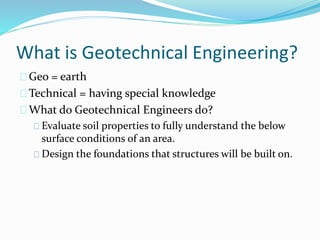Excitement About Geotheta
Excitement About Geotheta
Blog Article
Get This Report about Geotheta
Table of ContentsThe Greatest Guide To Geotheta10 Easy Facts About Geotheta ExplainedGetting The Geotheta To WorkGetting The Geotheta To WorkRumored Buzz on Geotheta

They conduct site examinations, collect examples, execute lab examinations, and assess data to review the suitability of the ground for building and construction jobs - Geo Tech Engineer. Based on their searchings for, geotechnical designers offer recommendations for structure layout, incline stability, retaining structures, and mitigation of geotechnical risks. They team up with other experts, such as architects, structural designers, and building and construction teams, to make certain that geotechnical considerations are incorporated into the total job design and application
By evaluating the habits and residential properties of dirt and rock, they can identify prospective geotechnical risks such as landslides, soil settlement, or incline instability. Their know-how helps avoid failings or mishaps that might threaten lives and home. Right here are some detailed obligations and obligations of a geotechnical engineer: Site Examination: Geotechnical designers conduct site examinations to collect data on subsurface conditions.
They analyze the information to comprehend the homes and behavior of the dirt and rock, including their stamina, leaks in the structure, compaction features, and groundwater conditions. Geotechnical Evaluation and Layout: Geotechnical engineers analyze the data collected during site investigations to examine the stability and viability of the site for construction jobs. They do geotechnical calculations and modeling to examine factors such as birthing capacity, negotiation, incline security, lateral earth pressures, and groundwater circulation.
Geotheta Fundamentals Explained
Foundation Style: Geotechnical engineers play a critical function in making structures that can safely sustain the intended structure. They examine the soil problems and load requirements to establish the suitable structure kind, such as superficial foundations (e.g., footings), deep foundations (e.g (https://flossy-rotate-3d1.notion.site/Why-Geotechnical-Engineers-are-Vital-for-Your-Construction-Projects-7c147cf012a34d1abe5134afbabc811f?pvs=4)., piles), or specialized methods like soil improvement. They consider elements such as settlement restrictions, birthing ability, and soil-structure communication to develop ideal foundation styles
They evaluate construction plans, screen site activities, and perform area evaluations to validate that the style suggestions are adhered to. If unpredicted geotechnical concerns emerge, they analyze the circumstance and give recommendations for remediation or changes to the design. Risk Analysis and Mitigation: Geotechnical engineers examine geotechnical dangers and threats related to the job site, such as landslides, liquefaction, or soil erosion.

Partnership and Communication: Geotechnical engineers work carefully with various other experts associated with a project, such as architects, structural designers, and building and construction teams. Efficient interaction and cooperation are vital to integrate geotechnical factors to consider into the overall project style and building and construction process. Geotechnical engineers provide technological experience, response queries, and guarantee that geotechnical demands are fulfilled.
Rumored Buzz on Geotheta
Below are some types of geotechnical designers: Foundation Engineer: Structure engineers specialize in making and assessing structures for structures. They analyze the soil problems, tons requirements, and website characteristics to figure out one of the most suitable structure kind and design, such as shallow foundations, deep structures, or specialized methods like stack foundations.
They evaluate the factors influencing slope security, such as dirt buildings, groundwater conditions, and slope geometry, and establish approaches to stop slope failings and alleviate risks. Earthquake Engineer: Quake designers concentrate on evaluating and developing structures to withstand seismic forces. They examine the seismic danger of a website, assess dirt liquefaction possibility, and develop seismic style standards to guarantee the safety and security and strength of frameworks throughout earthquakes.
They do field testing, accumulate examples, and evaluate the accumulated data to identify the soil homes, geologic formations, and groundwater problems at a site. Geotechnical Instrumentation Designer: Geotechnical instrumentation engineers concentrate on tracking and measuring the behavior of soil, rock, and frameworks. They set up and keep instrumentation systems that keep track of variables such as soil negotiation, groundwater degrees, incline activities, and structural displacements to analyze efficiency and offer very early warnings of possible problems.
An Unbiased View of Geotheta
They conduct tests such as triaxial examinations, loan consolidation tests, straight shear examinations, and permeability examinations to gather data for geotechnical analysis and style. Geosynthetics Designer: Geosynthetics engineers focus on the design and application of geosynthetic materials, such as geotextiles, geogrids, and geomembranes. They utilize these products to boost soil stability, strengthen inclines, supply water drainage remedies, and control disintegration.
They have a tendency to be investigatory people, which means they're intellectual, introspective, and analytical. They wonder, methodical, sensible, logical, and rational. Several of them are likewise social, meaning they're kind, generous, cooperative, client, caring, handy, compassionate, sensible, and friendly. Does this seem like you? Take our totally free occupation examination to figure out if geotechnical engineer is one of your leading job suits.
In the office atmosphere, geotechnical engineers use specialized software program devices to do estimations, develop styles, and evaluate data. They prepare records, testimonial task requirements, connect with customers and group participants, and coordinate job activities. The office setup gives a helpful environment for research study, analysis, and partnership with various other experts entailed in the job.
See This Report on Geotheta
They often see job sites to perform website examinations, assess geotechnical conditions, and gather information for evaluation. These brows through include traveling to various places, occasionally in remote or difficult surfaces. Geotechnical designers might perform dirt tasting, conduct tests, and display building tasks to guarantee that the geotechnical facets of the job are being see here implemented appropriately.
Geotechnical engineers additionally work in specialized geotechnical research laboratories. In these facilities, they carry out experiments, perform tests on dirt and rock samples, and examine the design residential properties of the materials. Geotechnical research laboratory engineers work thoroughly in these atmospheres, taking care of testing tools, running instruments, and tape-recording data. They collaborate with other laboratory team to guarantee exact and reputable screening outcomes.
Report this page